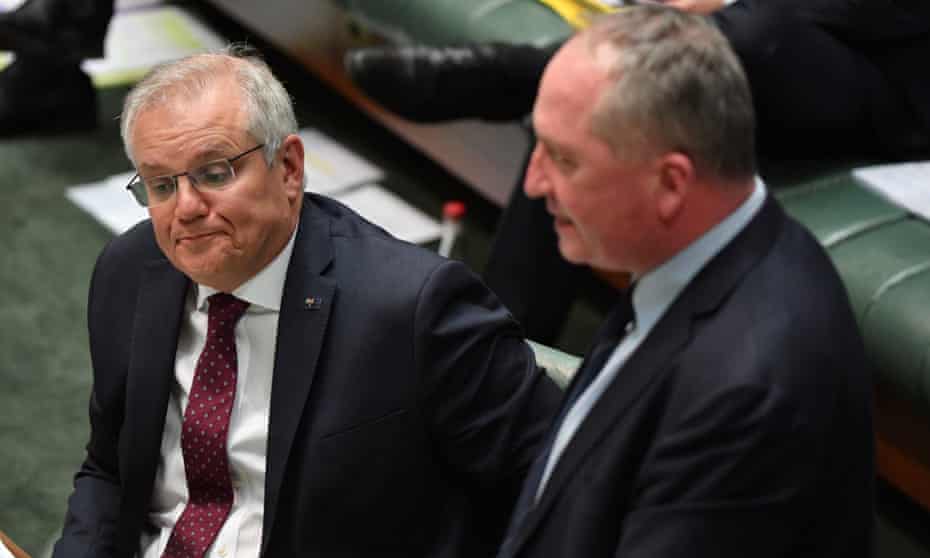No change to Australia’s 2030 emissions reduction target as Scott Morrison focuses on net zero deal
While the Nationals remain divided over a 2050 net zero commitment, negotiations continue about an accompanying package on regional jobs and infrastructure
Download the free Guardian app; get our morning email briefing

Last modified on Mon 18 Oct 2021 05.19 EDT
The Morrison government has all but ruled out increasing Australia’s 2030 emissions reduction target despite sustained diplomatic pressure from key allies, including the United States and the United Kingdom.
While stepping back from a significant attempt to increase the Abbott-era 2030 target after an effective Nationals veto on Sunday, Scott Morrison was more pointed on Monday about landing a net zero target ahead of the looming Cop26 in Glasgow.
The prime minister told Liberal party MPs net zero would be a cabinet decision, and it would be expressed as a nationally determined contribution under the Paris agreement.
The prime minister’s reference to cabinet is an implicit warning that any ministers who disagree with a net zero commitment will need to consider their positions. Morrison also warned there would be price to pay if Australia failed to join allies in embracing a 2050 target.
About six of the Nationals’ 21 MPs have expressed opposition to signing up to the target: Matt Canavan, Llew O’Brien, Keith Pitt, Sam McMahon, George Christensen and David Gillespie.
But while some are implacably opposed, both Liberals and Nationals sound increasingly confident a deal will be reached in the coming days. Negotiations were continuing on Monday afternoon about an accompanying package expected to include regional job creation initiatives and infrastructure projects.
The Nationals deputy leader, David Littleproud, told the ABC while some MPs had staked their claim against the plan, “the majority of the room want to work pragmatically through this”.
The former Nationals leader and deputy prime minister, Michael McCormack, urged his colleagues to get on with it. McCormack told Guardian Australia agreement needed to be reached this week.
“I don’t think we can really delay it any further. Because we are not holding anyone to ransom, or holding a gun to anyone’s head, we are not doing that,” he said on Monday.
“We will go through it carefully and methodically and come up with what we feel we need to do for the regions,” the former party leader said. “People are worried about regional jobs going and the cost of power and those energy intensive industries like manufacturing and mining.”
Victorian MP Darren Chester echoed that view during a meeting of the Nationals party room on Monday, telling colleagues it was not in their practical or political interests to draw out any negotiation with the Liberals. He said it would be best to determine a set of principles informing a regional support package, and if they were met, adopt the commitment.
Morrison’s goal of including a 2050 net zero target as part of Australia’s nationally determined contribution (NDC) appears at odds with the text of the 2015 Paris agreement. According to the agreement, NDCs are supposed to be updated in five-year cycles. The current cycle is focused on 2030.
Countries also agreed to consider submitting long-term low-emissions development strategies, which many have translated into a plan to reach net zero by 2050. But those strategies were meant to be separate and additional to the shorter-term goals set as part of an NDC.
As Morrison tracks towards the Glasgow climate conference in a fortnight, the government is expected to release new emissions projections in coming days that will forecast over-achievement on the Abbott-era 2030 target of a cut of between 26% and 28% on 2005 levels.
A recent report by researchers at Climate Analytics said it was likely the new projections would forecast that emissions would fall by between 30% and 38% by 2030 – well beyond the current government’s target. The US and the UK, and a number of business and investor groups have also urged the government to increase ambition for 2030.
But Barnaby Joyce made it clear on Sunday any formal increase in the 2030 target was off the table, and Morrison confirmed that in question time on Monday, telling the house he would be in a position “to advise the Cop26 of our success in meeting and beating that target … when I’m there in a few weeks time”.
Labor pressed Morrison on whether a commitment to net zero by 2050 meant the government would now need to achieve a 43% emissions reduction target by 2030 – as Angus Taylor, the energy and emissions reduction minister, had contended last year when attacking Labor for signing up to net zero.
The prime minister said that was not the case, because emissions reductions between now and 2050 would not be “linear”.
Liberal MPs were briefed on Monday about a 2050 roadmap Taylor has developed with input across the government. According to MPs present at the meeting, Taylor said coal exports would start to decline from 2025, but international demand for gas would continue until 2040.
MPs expressed a range of views. The Liberal senator Gerard Rennick said he was opposed to net zero, and a handful of other Liberals were also lukewarm. But a majority of Liberals either support net zero, or the mid-century goal and a higher 2030 target.
